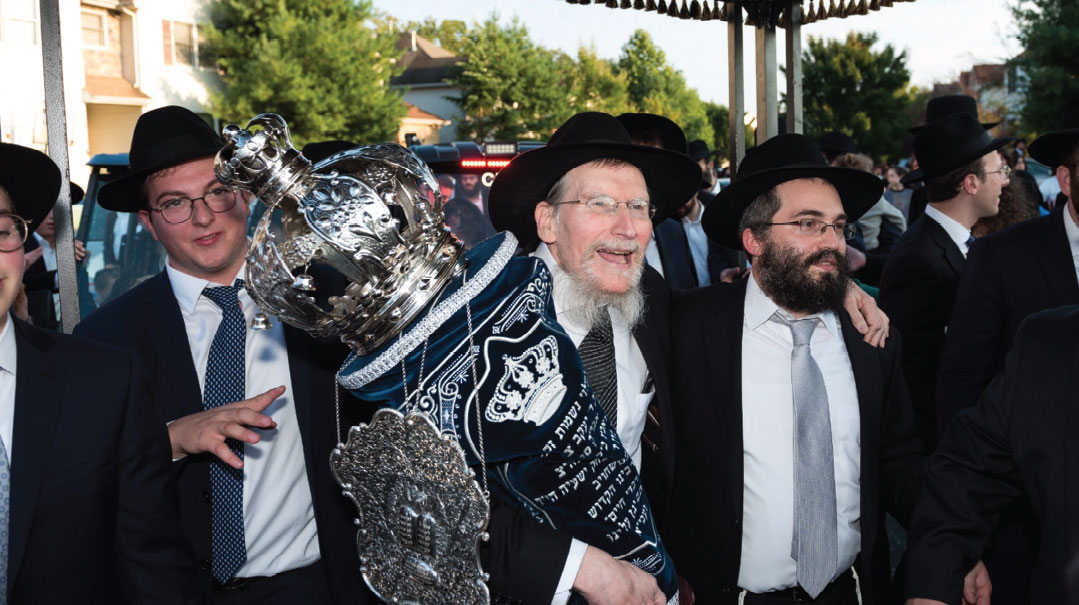We Knew He Cared

Rabbi Shlomo Gissinger used halachic authority with genuine warmth and love

Although young, my husband was honored to be a confidant of the world-class posek, who occasionally called him for advice on handling complicated sh’eilos. Only at the levayah did my husband learn the truth — Rabbi Gissinger made a habit of building up the confidence of a new generation of rabbanim, and went out of his way to be mechazek them by feigning a need for their suggestions.
Rabbi Gissinger, whose first yahrtzeit fell on Tuesday, 12 Elul, radiated so much love to all he met that everyone was convinced that they had a uniquely close relationship with him.
“I really got in trouble during the shivah,” says the Rav’s son, Binyomin Gissinger of Lakewood. As I sit with him and his mother in her home as they prepare for the gala hachnassas sefer Torah being held on the first yahrtzeit, where Rebbetzin Gissinger shares memories of her esteemed late husband, he reads off text after text he received in the days after his father’s petirah. “Guys would say, ‘You know how close I was to him.’ ” They’d insist that their relationship with the Rav had been special, something really out of the ordinary. But despite his diplomatic equivocation, Reb Binyomin knew the truth — there were hundreds, if not thousands, who were equally sure that Rabbi Gissinger loved them more.
It wasn’t an act. The Rav with the radiant face, the leader of hundreds of congregants, the expert whose opinions in kashrus and medical halachah were sought by talmidei chachamim around the world, loved every single Jew deeply and unconditionally.
He cared.
Halachah Quest
In the Gissinger dining room on Sunset Road, the walls are a cheerful, homey gold and 16 chairs flank a dining room table that looks to be about half the length of a football field. If a picture is worth a thousand words, the gentle smiles of Rav Avrohom Pam and Rav Yaakov Kamenetsky and the grandfatherly visage of the Chofetz Chaim gazing down from the walls speak volumes about the character of the giant who lived here.
Shlomo Gissinger of Brighton Beach, Brooklyn, was born in 1944 to a family whose values imbued him with the capacity for greatness. His father, a tailor, spent months being fired weekly for refusing to work on Shabbos. Eventually, his principled stand won the admiration of an Italian factory foreman, who opened the production floor each Sunday for Mr. Gissinger to make up his Saturday quota.
As a bochur in Yeshiva Torah Vodaath, Shlomo found his rebbi for life in Rav Yaakov Kamenetsky. It was Rav Yaakov who sent Shlomo to Lakewood, predicting that the bochur would thrive in Beth Medrash Govoha, then comprising just 129 yungeleit under the leadership of Rav Shneur Kotler.
And like the chassidic tale of the man who travels in search of a treasure, only to find it buried in his own backyard, it was in Lakewood that the budding talmid chacham learned of a girl from Brighton Beach named Merril Gold.
The shidduch came about through a happy accident. Merril’s twin sister, Mashie, and brother-in-law, Chaninah Posner, extended a Shabbos invitation to a bochur they thought might be a good match for Merril. Not wanting the boy to feel awkward, they invited a friend to come along with him. It was the afterthought, Shlomo Gissinger, who caught the Posners’ eye.
“Whenever the conversation became heated, he smoothed things over,” recalls Rebbetzin Gissinger. Although possessed of a formidable intellect himself, even as a young man, Rabbi Gissinger’s concern for others was what set him apart.
All her life, the kallah had davened for one thing: “Shivti b’veis Hashem kol yemei chayai.” With her marriage to Shlomo Gissinger, her dream became a reality. The young couple made their home in Lakewood, where the kallah taught for 15 years in the local Betzalel Hebrew Day School, allowing Reb Shlomo to learn undisturbed in BMG’s kollel.
Aside from the regular yeshivah limudim, he also began to delve into topics that were somewhat off the beaten track, with a thoroughness and expertise that belied his years. The subject of tolaim was something of a meis mitzvah in those years, with few people aware of the seriousness, and prevalence, of the issue. With his rebbi, Rav Yaakov’s, encouragement, Rabbi Gissinger began to spread the word about this underestimated prohibition.
“My father was the trailblazing rabbi trying to convince the world that eating unchecked lettuce was worse than eating chazir,” remembers his son Reb Binyomin, who recalls putting heads of lettuce through their washing machine’s spin cycle in order to analyze the effectiveness of various cleaning methods.
Undaunted by communal skepticism, Rabbi Gissinger spoke out about the gravity of eating insects, and the multiple issurim each bug represented. Together with Rabbis Yitzchok Sokol and Pinchos Bodner, he produced a video on the topic and presented workshops in schools. In time, he became the rav hamachshir of the nascent Bodek, and galvanized others, including Rav Moshe Vaye of Israel, to champion the cause as well.
In pre-Internet days, how did a sheltered kollel yungerman become an expert in thrips, aphids, and obscure details like their pedicel antenna structure?
Rabbi Gissinger put in hours at the public library, often without taking notes, committing vast amounts of scientific literature to memory. This academic proficiency would become useful later in life as well, as he became known as the address for complex medical sh’eilos across a broad range of specialties.
But it wasn’t the technical knowledge that caused people to seek him out — that came later.
“It was the chesed in his heart,” says Rebebtzin Gissinger simply.
Oops! We could not locate your form.








Comments (1)